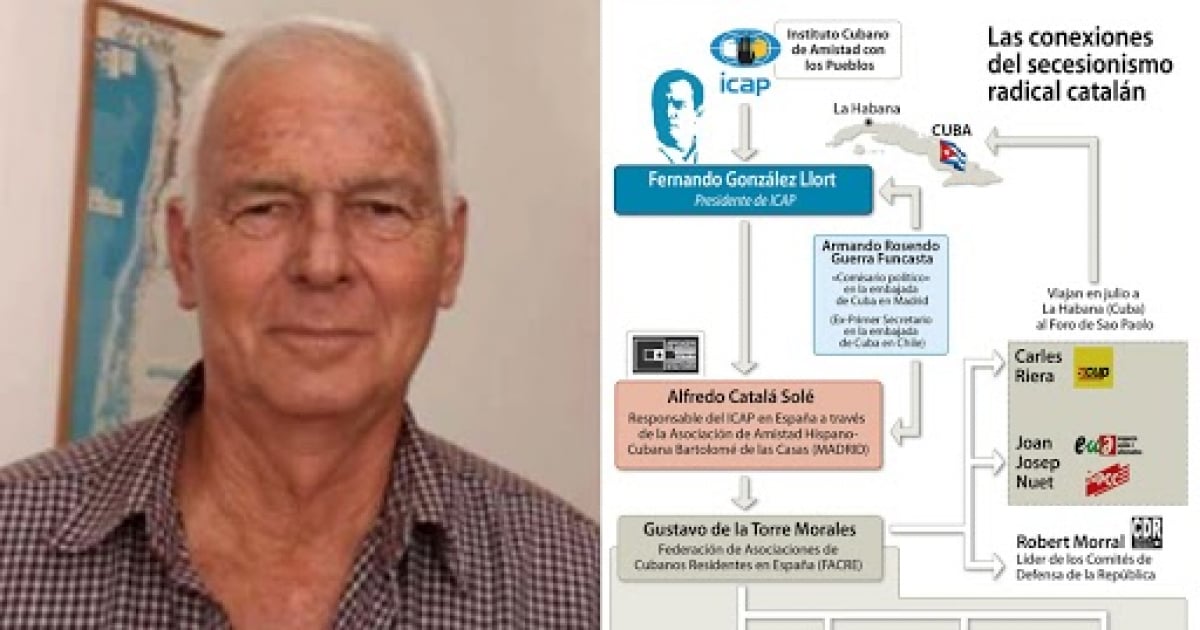
The Cuban government maintains an alleged Intelligence network in Spain, directed by the officialArmando Guerra Funcasta, which acts under the diplomatic cover of First Secretary of the embassy in Madrid, in charge of political affairs, and which is articulated through more than 50 associations of emigrants, which maintain links with radical left parties and organizations in Catalonia and Basque Country, the Madrid newspaper revealed this MondayABC.
Funcaste WarHe arrived in Madrid in February 2020, from Chile, where he also served as First Secretary of the Cuban embassy and was identified by Chilean media and anti-Castro opponents as the instigator of the street revolts against the government ofSebastian Piñera.
A former officer of the Directorate of Military Intelligence (DIM) of Cuba, resident in Europe and who asked not to be identified, toldCyberCuba who doesn't knowFuncaste War, but recalled that "Chile is another of the priority objectives of Cuban espionage to plant and recruit agents, especially Cubans with a Chilean passport, which facilitates movements around the world."
The fall ofWasp network It led to the recognition of the "blunder of sending spies abroad with false identities" and, since then, Cuba changed tactics and has sent "officers and agents with their real identities to countries like Chile, where they had to be nationalized," he concluded.
He second in command in the supposed Cuban Intelligence network in Spain, he would beAlfredo Catalá Solé, as representative of the ICAP in Spain, to which they are subordinate Gustavo de la Torre Morales and Ana Posada Lee, main leaders of theFederation of Associations of Cubans Resident in Spain (FACRE), who maintain "fluid and constant" relationships withCUP, Left handed United i Alternative (EUiA) and theDefense Committees of the Republic (CDR), details the Spanish newspaper, with a monarchical and conservative orientation.
The Madrid newspaper quotes the former spyFernando González Llort, current president of the Cuban Institute of Friendship with the People (ICAP), as one of the leaders of the alleged Intelligence network, but a former officer of the Cuban secret services who resides in a Spanish city and who spoke on condition of remaining in anonymity, linked the numerous visits of the former head ofthe Wasp network to Spain to "visit his father, who lives here; and who never had a public profile during the campaign to liberate the Five" spies imprisoned in the United States.
"Fernando (González Llort) entered the ISRI as a DGI cadet and it was said that he was the only one in that course without direct links to the MININT, but other sources assured that his father was a veteran of Cuban Intelligence," he concluded.
González LlortHe served his full sentence, almost 18 years, in the United States and did not enter the exchange established byBarack Obama andRaul Castro Ruz, which included, in addition to the Cuban spies who were still in prison, the AmericanAlan Gross and to the CubanRolando Sarraf Elijah, whom the Cuban government accused - respectively - of distributing illegal communication equipment among the minority Jewish community on the island; and as a traitor for revealing secrets to the CIA station in Havana, from his position as a DGI officer.
The platformWe defend Cuba, heCasal Popular 3 Voltes Rebels ofNew Neighborhoods, self-managed byCDR, theCUP andArran, among other groups, organized a meeting of "paella, mojitos, salsa and slogans" withFrom Morales Tower andRobert Morral, member of theCDR Catalans, to twin Havana municipalities with others in Catalonia and celebrate the 65th birthday of Hugo Chávez, he recalledABC, which in addition to the information on the cover, dedicated an Editorial to Castro's penetration in Spain.
In itBasque Country, where a media outlet financed with public money praises the Castro dictatorship, the head of the Cuban network in Spain would beBarbara D'Wolf; In Andalucia,Fidel Aguado In asturias,Barbara Marín Prada; in the Canary Islands,José Luis Mosqueda Relova, in CataloniaAdel Pereiro and the already mentioned Ana Posada; in the Autonomous Community of Valencia,Dew Stripe andDavid Rodriguez, which would act asagents of influencein favor of Cuban interests in Spain and trying to manipulate Cuban emigrants.
A source close toNational Intelligence Center (CNI) neither confirmed nor denied that the information published this Monday byABC, comes from secret service sources, but clarified that - unlike the Cubans - the Spanish Counterintelligence usually "gives strings to foreign officers and agents to locate a possible network and its national links."
CyberCubatried to get the diplomat's versionFuncaste War and the rest of the Cubans mentioned byABC but, until the time of writing this note, none had responded to our emails and viaMessenger ofFacebook, exceptBarbara D'Wolf, which seems to have no presence on social networks; although all of them appear in publications from the Cuban Embassy in Madrid and the consulates in different Spanish cities.
Although apparently not linked, this Monday's revelation would be the third sign of the deterioration of relations between Spain and Cuba, after theclose ofthe bank In the Habana, a recently privatized bank, but with state participation and the decision toMeliá to return three hotels it managed in Cayo Guillermo to the Cuban government.
What do you think?
SEE COMMENTS (19)Filed in: